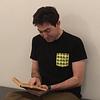Take a photo of a barcode or cover
There was far more monkey piss than I would have imagined!!
Ok, first I have to admit I appreciated the "modern" verbiage for all the crazy antic of the participants and I dearly would have loved to know how the original Chinese verbiage sounded/was written because some of the stories were genius.
For 16th century tale, this has earned its golden spear to be a classic! Again, one of those stories/books always mentioned, copied, and imitated but rarely actually read, well, I read it. And I own it so I can read it again.
Ok, first I have to admit I appreciated the "modern" verbiage for all the crazy antic of the participants and I dearly would have loved to know how the original Chinese verbiage sounded/was written because some of the stories were genius.
For 16th century tale, this has earned its golden spear to be a classic! Again, one of those stories/books always mentioned, copied, and imitated but rarely actually read, well, I read it. And I own it so I can read it again.
A wonderfully whimsical glance into the story that has informed much of East Asian literature and folklore. The Monkey King, Great Sage and Equal of Heaven is truly a wonderful character and it is no wonder he is an inspiration for so many characters.
If I am to have some complaints, it is that Monkey far outshines the other characters. Tripitaka comes off as whiny and Sandy has almost no interaction at all. Pigsy is a good contrast with Monkey, so his character is valuable.
If I am to have some complaints, it is that Monkey far outshines the other characters. Tripitaka comes off as whiny and Sandy has almost no interaction at all. Pigsy is a good contrast with Monkey, so his character is valuable.
I was just not into this. Not enough to abandon it but did not enjoy this too much.
Taste old monkey's cudgel. Almost peed myself laughing when Monkey, Pigsy and Sandy gave 'holy water' to a bunch of genocidal Taoist Immortals.
adventurous
funny
lighthearted
medium-paced
Plot or Character Driven:
Plot
Strong character development:
No
Loveable characters:
Yes
Diverse cast of characters:
Complicated
Flaws of characters a main focus:
Yes
Way goofier than I would have ever imagined the book to be. Glad to have read it.
I read this back in high school and since then I've read some parts of Anthony C. Yu’s unabridged translation, but Monkey excels as a fun, approachable introduction to this classic tale. This time I read it aloud (and had great fun voicing Monkey himself like a bruiser from Dragon Ball). My only complaint is that the Bull Demon King and the The Six Eared Macaque are nowhere to be found.
The new (2021) translation and abridgment by Julia Lovell is the best thing I read this year. I've read other translations (Arthur Waley's abridgment, vol 1 of Anthony C. Yu's unabridged), and like the author of this review in the Los Angeles Review of Books, I think the amount of work Lovell did to develop this engaging and energetic new edition warrants calling it more than a translation. Highly recommended.
Considering roughly a third of their problems involve needing to find a way to cross some water, it would be nice if they ever remembered their horse is a fucking sea dragon.
I enjoyed this (much) abridged translation. I felt a little guilty for choosing it (and not a modern, unabridged translation) but truthfully, I think the length was just right for me. Though fun, I think it would have felt very repetitive to me had I read an unedited version. Of the four "sections", I really enjoyed the first part concerning Monkey's origins and battles with heaven. It was fun and often funny, and I liked Monkey's greedy, selfish nature. After the story shifted to the main character (in my translation, the monk is called Tripitaka) and his journey to India for the sacred scriptures, I found it a little less engaging. It became much more episodic, and each of Tripitaka's (and his disciples) encounters with various evil demons and enchanted kings became a tiny bit predictable.
As my knowledge of Chinese history, mythology, and history is nonexistent, I do think that I missed much of the satire and allegory this work is known for. I read it more as a collection of adventures, highlighting a time and place I don't know much about, and still found it very enjoyable.
As my knowledge of Chinese history, mythology, and history is nonexistent, I do think that I missed much of the satire and allegory this work is known for. I read it more as a collection of adventures, highlighting a time and place I don't know much about, and still found it very enjoyable.





